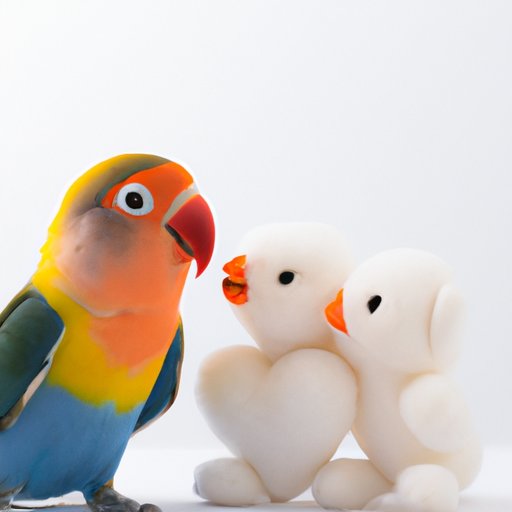Introduction
Lovebirds are small, colorful parrots that make wonderful pets. They are social birds that need plenty of attention and interaction with their owners. If you’re thinking about getting a lovebird as a pet, it’s important to understand the basics of caring for them. Proper care is essential for a happy, healthy lovebird.

Provide a Safe and Secure Environment
The first step in taking care of your lovebird is to provide a safe and secure environment. The cage should be large enough for your lovebird to move around freely but not so big that it feels lost. It should also be made of sturdy materials that can’t be easily chewed or broken by your lovebird. Make sure the cage is escape-proof and has no sharp edges or points.
It’s also important to prevent predators from entering the cage. Keep the cage away from windows and other potential entry points, such as doors and vents. Install locks on the cage if necessary to ensure your lovebird cannot escape.
Create an Appropriate Diet
An appropriate diet is essential for your lovebird’s health. Offer a variety of pellets, seeds, fruits, and vegetables. Pellets should make up the bulk of your lovebird’s diet, but offer occasional treats such as unsalted nuts and fresh fruits and vegetables. Avoid giving your lovebird any food that is high in fat, sugar, or salt.
Provide Toys and Entertainment
Lovebirds need plenty of stimulation and entertainment. Provide swings and ladders for your lovebird to climb on, as well as foraging toys that encourage it to explore and engage its natural curiosity. Rotate the toys regularly to keep your lovebird interested and engaged.
Maintain Cleanliness
It’s important to keep your lovebird’s cage clean. Change the bedding regularly, and keep the cage away from dust and other contaminants. Regularly check for signs of pests, such as mites and fleas, and treat accordingly.
Set Up a Regular Grooming Schedule
Grooming is an important part of keeping your lovebird healthy. Offer baths and showers to your lovebird to keep its feathers clean and healthy. Trim its beak and nails when needed, and brush its feathers regularly to remove excess dirt and debris.
Monitor Health
It’s important to monitor your lovebird’s health. Watch for signs of illness, such as loss of appetite, lethargy, and changes in behavior. If you notice any of these signs, contact your veterinarian immediately.
Give Your Lovebird Attention
Your lovebird needs plenty of attention and interaction with its owner. Spend time with your lovebird every day, and form a strong bond with it. Talk to your lovebird and offer it treats to show your affection. This will help your lovebird feel safe and secure.
Conclusion
Taking care of a lovebird requires patience and commitment. With proper care, your lovebird can live a long, healthy life. By providing a safe and secure environment, creating an appropriate diet, offering toys and entertainment, maintaining cleanliness, setting up a regular grooming schedule, monitoring health, and giving your lovebird attention, you can ensure your pet stays happy and healthy.
(Note: Is this article not meeting your expectations? Do you have knowledge or insights to share? Unlock new opportunities and expand your reach by joining our authors team. Click Registration to join us and share your expertise with our readers.)
